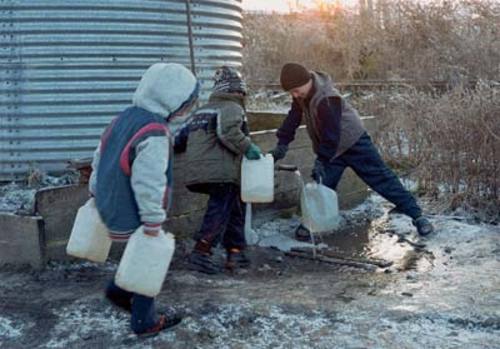
Ingush-Ossetian Relations Show Signs of Improvement
Publication: Eurasia Daily Monitor Volume: 7 Issue: 1
By:

On December 17, Ingushetia’s President Yunus-bek Yevkurov and the head of North Ossetia, Taimuraz Mamsurov, signed an agreement on developing good-neighborly relations between the two republics. The agreement stipulates a plan of joint actions for the republican governments and government controlled civil organizations in 2010. Drawing on the importance of the agreements, Yevkurov stated it was a landmark day in the history of both peoples –the Ingush and the Ossetians (www.kavkaz-uzel.ru, December 17). The well-known liberal Russian economist Andrei Illarionov rated the agreement between Yevkurov and Mamsurov as the most important event in domestic Russian politics in 2009 (Independent Information Center, December 29).
The agreement aims to end the longstanding tensions between Ingushetia and North Ossetia over the disputed Prigorodny district of North Ossetia and its capital Vladikavkaz. The Ingush side laid claims to territory in neighboring North Ossetia that once belonged to Ingushetia, and the dispute finally erupted into large scale violence in fall 1992. Hundreds of people were killed in a short but bitter war and tens of thousands of ethnic Ingush –up to 60,000 people– were forced to leave North Ossetia or fled fearing for their lives following the conflict.
Numerous attempts to reconcile the two republics had been made prior to the latest agreement, but they had limited results. The issues of the disputed territory, the refugees’ return and concerns for their safety have remained points of contention between the governments of Ingushetia and North Ossetia. Even though the Ingush refugees were partially allowed to return to their homes, some areas in North Ossetia, including Vladikavkaz, have remained off limits to the return of Ingush refugees. “The ultimate aim [of the agreement] can be only one thing: the return to the Prigorodny district of absolutely all the Ingush people who left it,” stated the Ingush presidential spokesman Kaloi Akhilgov. North Ossetian leader Taimuraz Mamsurov, for his part, stressed the necessity of finding solutions to the problems shared by both neighboring republics, such as poor economic development, corruption and crime (www.kavkaz-uzel.ru, December 17).
As an oblique sign that the agreement is being forced upon the regional leaders rather than a product of internal and voluntary development, there has been little information about its actual contents. There was no public discussion prior to the signing of the agreement either in Ingushetia or North Ossetia. Instead, the leaders of both republics made several conciliatory statements that apparently were meant to pave way for the introducing the plan for yet another final settlement.
The Russian government plans to invest 7 billion rubles ($230 million) into the economy of the Prigorodny district in an attempt to create jobs for the returning Ingush refugees (Regnum news agency, December 17). For the Prigorodny district, with its current population of little more than 100,000, this investment is substantial, provided it is used with prudence.
The disastrous security situation in Ingushetia may have been one of the main drivers behind the latest attempt to return the Ingush refugees to their homes in North Ossetia. Little Ingushetia has become arguably the hottest spot in the volatile North Caucasus region, where attacks, abductions, clashes between government forces and the insurgency are almost a daily routine. The Ingush religious authorities and elders, an important and respected institution in Ingushetia, asked President Dmitry Medvedev to help stop what they called in their address the “elimination of the Ingush population” in the past several years (www.ingushetiyaru.org, December 19). On several occasions, President Yevkurov conveyed the message that resolving the Ingush refugees issue would undermine the influence of “extremists.” Yevkurov is himself a live victim of the destabilization in Ingushetia, having barely survived a suicide bomber attack in June 2009, which added an extra weight to his words. Moscow may have been convinced that facilitating the Ingush refugees’ return would provide a way out of the unending low-key civil war in Ingushetia by soothing the sensitive issue of the territorial dispute over Prigorodny district.
However, at the same time, the mass return of the Ingush refugees will hardly be received well in North Ossetia, where locals have little real experience of co-existence with the Ingush, but have heard much about deadly attacks in Ingushetia and Ingush participation in the Beslan school hostage drama in 2004. Therefore, Moscow will have to strike a careful balance between pushing the Ossetians and the Ingush to find a permanent settlement and at the same time avoiding alienating these two peoples.
Another unexpected result of the mass return of the Ingush refugees to North Ossetia might be the spread of Islamic extremism and its related insurgency to the relatively quiet North Ossetia. Even though North Ossetian officials, contrary to various reports, deny there is a problem with Islamic insurgency in the republic, the republican authorities decided to put up banners in the streets to fight extremism and terrorism (www.kavkaz-uzel.ru, December 30). This can be interpreted as a tacit acknowledgement of the presence of an Islamic insurgency in North Ossetia, where Muslims make up approximately 25 to 30 percent of the total population. Moreover, the head of South Ossetian Orthodox Church pointed out that Wahhabi cells were already present even on the South Ossetian religious landscape, where previously there had been no Muslim tradition at all (www.osinform.biz, December 19).
If the insurgency and the law enforcement agencies expand their war to North Ossetia, it may even trigger another outbreak of the Ossetian-Ingush conflict, as the questionable practices of the security services will be rendered even more irksome by adding an ethnic dimension to the fight.
It already looks as if, by transferring a portion of the Ingush population to North Ossetia, Moscow is delegating the North Ossetian government the authority to deal with the insurgents. Sources in Ingushetia recently complained about the abduction of a 60 year-old Ingush man in the Prigorodny district and his torture and mistreatment by North Ossetian police (www.ingushetiyaru.org, December 16, 30).




